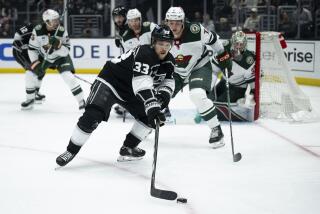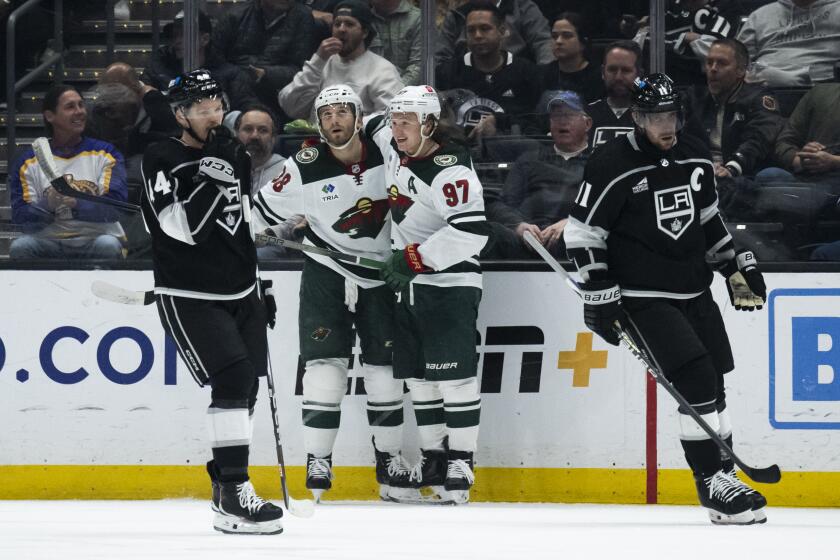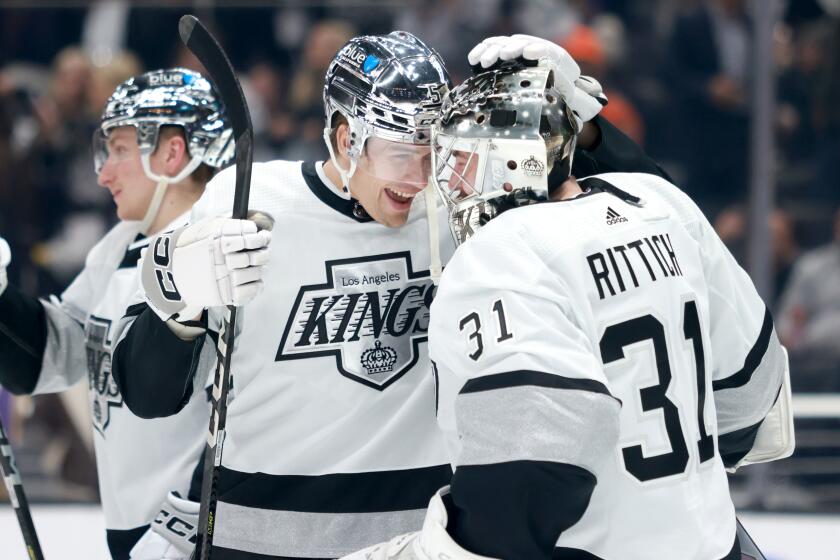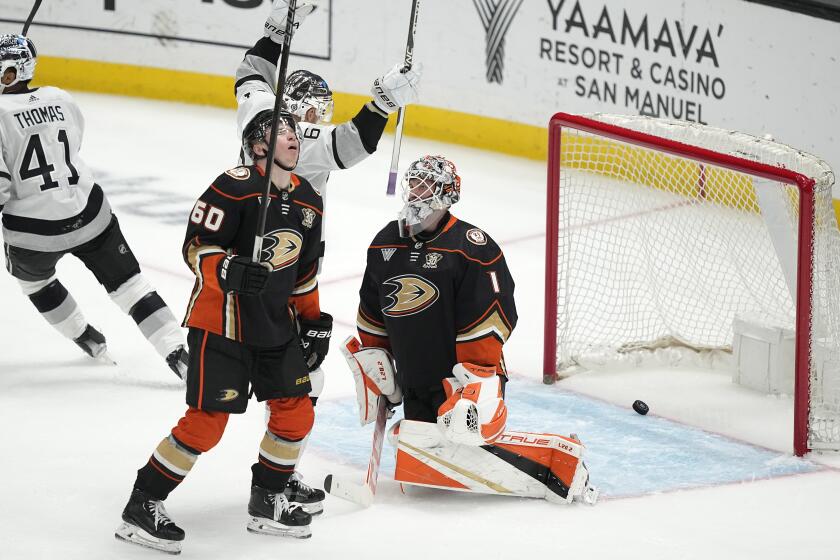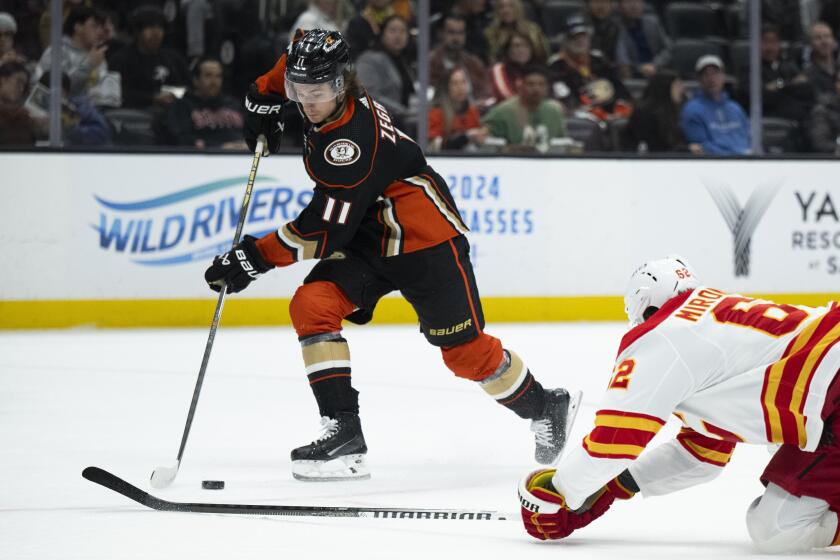This could help Penguins later
PITTSBURGH -- You’re the Pittsburgh Penguins.
You’ve been shut out by the Detroit Red Wings in the first two games of the Stanley Cup finals. Your top scorer this season, Evgeni Malkin, has been invisible. Worse, he’s playing as if he’s allergic to being hit.
The most noteworthy contribution from Gary Roberts, inserted into your Game 2 lineup for his leadership, was a reprehensible left hook to the head of Detroit’s Johan Franzen, who had sat out the previous six games because of a concussion.
You’re claiming the Red Wings are obstructing you at every turn and hoping the referees will agree and cut you a break, but you’re getting nowhere. You can’t seem to get around or through Detroit’s poised, balanced defense and gritty forwards. “We don’t really see too many teams like them out East,” forward Ryan Malone said.
Welcome to the Stanley Cup finals. Blink twice more and it will be over.
If you’re the Penguins, what do you do tonight at Mellon Arena to halt this imminent rout besides relying on an 8-0 home playoff record and the vocal support of great fans in a great sports city?
“Physical play is their only chance,” said Ducks General Manager Brian Burke, whose team defeated the Red Wings in the Western Conference finals last spring and went on to win the Cup.
“Late in the game, I wouldn’t say there was intelligent physical play, but they were physical, and playing physically is what they need to do,” he said of Game 2
“You don’t need all 12 forwards doing it, but I think we got the puck deep on Detroit and you’ve got to make puck retrieval difficult.”
Patience, he suggested, is a virtue the Penguins need. The Red Wings’ defensemen, Burke said, pass to each other “five, six times before they see something they like. It’s frustrating for an aggressive team.”
Burke said he has watched as many playoff games as he can, undoubtedly making him the cause of Versus’ postseason ratings jump. He said he didn’t predict a winner but expected the Penguins would have a tough time against the Red Wings, who made last year’s Western finals too close for Burke’s liking.
“It’s a young team and a lot of those guys are new at this, so they’ve got to have a learning curve,” he said of the Penguins.
“Now, Pittsburgh gets to go home and see what it can do.”
Penguins Coach Michel Therrien said Tuesday he saw a better work ethic in Game 2 than in the opener, and he hopes to build on that.
“We’ve got to make some adjustments about our concentration,” he said. “A few times there’s stuff I didn’t like. And we’ll be fine. We’ll be fine.”
He said it twice, maybe to talk himself into believing it.
If he does, he’s among a select few.
The Red Wings have played too well in too many noisy arenas before this to expect they will unravel in front of a hostile crowd tonight. Their playoff road record is 5-3, including the last two games of their second-round sweep of Colorado and the clincher of the Western Conference finals against Dallas.
“What everyone says in the playoffs is, ‘OK, you go to the visiting team, you have to always weather the storm.’ Why is that?” Coach Mike Babcock said.
“Do we hear that enough that we make that true, or is there a reason we can’t be the storm?”
The storm that rains on the Penguins’ Stanley Cup parade hopes, certainly.
If the Penguins don’t rally tonight or Saturday in Game 4, they can at least look to history for some consolation. A glance at the last 25 years of Cup champions suggests that a young team must go deep in the playoffs and lose in order to realize the extent of the perseverance it takes to win.
The star-studded Oilers lost the 1983 finals to the New York Islanders but beat them in 1984, the first of five titles in seven seasons. The Red Wings were swept out of the Cup finals by New Jersey in 1995 and lost the Western Conference finals to eventual champion Colorado in 1996 but won consecutive titles in 1997 and 1998, the last team to do that.
More recently, the Ducks lost to New Jersey in the 2003 Cup finals and to Edmonton in the 2006 Western finals before winning the Cup last spring.
Burke said he subscribes to the lose-before-you-can-win theory “to a point. I don’t think we win last year if we didn’t go to the conference final the year before. Getting to the third round you learn what it takes to get to the top of the hill.
“This is far from over for the Penguins, and if they’re unsuccessful, though, they’ll get a great benefit.”
They don’t want benefits. They want wins. Scoring a few goals would be a good start.
Sidney Crosby, on the ice early for some individual work before the Penguins’ optional skate Tuesday, said he wants to make sure desperation is at the forefront tonight.
“It’s two-nothing, and we haven’t scored. So we have to find ways to score goals,” he said.
He has mastered the art of understatement, but he and the Penguins won’t master the Red Wings. Not this year, anyway.
--
Helene Elliott can be reached at helene.elliott@latimes.com. To read previous columns by Elliott, go to latimes.com/elliott.
More to Read
Go beyond the scoreboard
Get the latest on L.A.'s teams in the daily Sports Report newsletter.
You may occasionally receive promotional content from the Los Angeles Times.
